11 Bedtime Routines That Will Help You Sleep Through the Night
Set yourself up for a successful slumber with these tips and tricks.
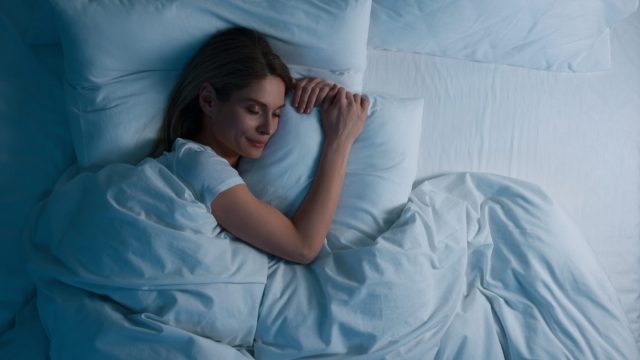
When you were a child, a consistent bedtime routine probably helped you get a good night's rest. As an adult, your habits may have changed, but your needs largely haven't. In fact, the more consistency you bring to bedtime, the more likely you are to fall asleep quickly and stay asleep soundly. The trick is to establish a healthy set of sleep hygiene habits that you can repeat every night. But what, exactly, should you be doing before bed to have your best-ever night of sleep? Read on for 10 expert-approved tips for a bedtime routine that'll set your internal clock to snooze.
RELATED: I'm a Sleep Scientist and These Are the Top 5 Unhealthy Habits I Avoid.
1
Set an alarm for your bedtime routine to begin.

Setting an alarm to wake you up at the same time every day can be a powerful way to set your circadian rhythm. You can also benefit from setting a gentle alarm before bedtime to let you know when it's time to start your nightly bedtime routine. This way you can "firmly establish a consistent sleep cycle," according to Nathan Baumann, PhD, a Denver-based clinical psychologist who specializes in sleep.
"When sleep is inconsistent, it can affect your circadian rhythm, which is a cycle that our body goes through daily to maintain wakefulness as well as regulate our sleep at night," he shares. "Our body's daily circadian rhythm affects our appetite, energy levels, and when we are primed to initiate sleep
Ideally, you should select a sleep time that aligns with when you naturally begin to feel tired—aiming to get a total of seven to nine hours of sleep every night.
2
Take a warm bath before bed.

According to a 2019 meta-analysis published in Sleep Medicine Reviews, taking a warm bath or shower an hour or two before bedtime can help you sleep better. But the reason may seem counterintuitive.
"There's actually good science behind this," Matthew Walker, PhD, neuroscientist and sleep specialist at the University of California, Berkeley, said during an interview on NPR's Life Kit podcast.
Your core body temperature needs to fall by two to three degrees Fahrenheit to initiate good sleep, according to Walker.
"The way it works is this: For you to get your heat out of the core of your body, you actually need to release that core heat through the outer perimeter surfaces of your body, namely your hands and your feet," he explained.
When you take that bath, you're bringing your blood to the surface so that your hands and feet can act as "radiators of that heat," Walker continued. "So you are essentially like a snake charmer—you are charming the heat out of the core of your body to the surface of your body."
RELATED: 6 Tips to Sleep Cooler on Hot Nights, Experts Say.
3
Lower your thermostat.
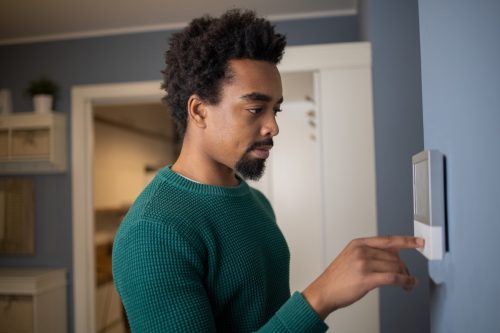
Another way to help lower your core temperature while you sleep is to lower the temperature in your home before bed.
"The thermal environment is a key determinant of sleep because thermoregulation is strongly linked to the mechanism regulating sleep," researchers explain in a 2012 study published in the Journal of Physiological Anthropology. "Excessively high or low ambient temperature may affect sleep even in healthy humans without insomnia."
But what exactly is the ideal temperature for falling and staying asleep? The National Sleep Foundation (NSF) recommends keeping things on the cooler side at around 60 to 67 degrees Fahrenheit.
4
Prepare your room for sleep.
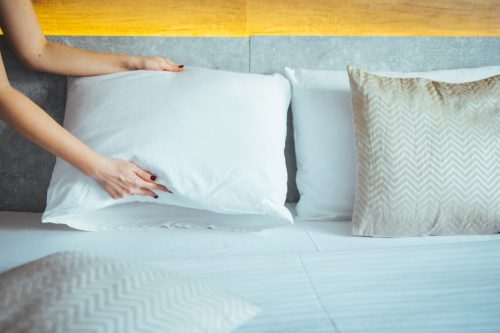
The temperature in your room isn't the only environmental factor that can have a serious effect on your sleep. There are several other ways to make your room more conducive to catching some Z's.
First, declutter your room and make your bed—ideally right after you wake up in the morning.
"Clutter can stress you out. Move those dirty clothes to the closet, and make the bed every morning: research shows that people who do may sleep better at night," experts from Johns Hopkins Medicine explain.
You should also consider "investing in high-quality sleep products to add to your bedtime routine," Julia Forbes, certified sleep science coach at Sleep Advisor, advises.
"Focus on products such as a supportive mattress, comfortable pillows, and breathable bedding because they can significantly improve your sleep quality and make it easier to both fall asleep and stay asleep," she says.
5
Drink a calming beverage.
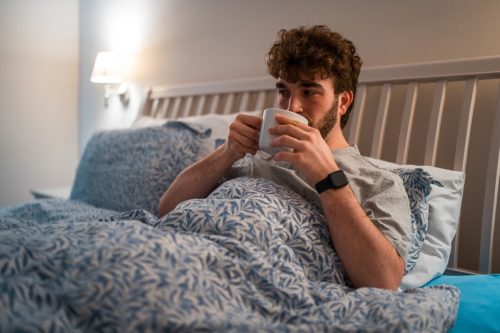
Some drinks, including those with caffeine or alcohol in them, can impact your ability to sleep.
"I would recommend avoiding caffeine for more than eight hours before going to bed," Carlie Gasia, certified sleep science coach at Sleepopolis, shares. "Caffeine can stay in your system for longer than you'd think and keep you awake at night."
However, there are also many calming beverages that may help you fall asleep and stay asleep for longer. Tart cherry juice, warm milk, and non-caffeinated teas such as chamomile, ashwagandha, and valerian root tea, are all believed to promote good sleep. In fact, any non-alcoholic and non-caffeinated beverage that you drink nightly can help signal bedtime simply by becoming a consistent part of your routine.
RELATED: 7 Best Clothing Items to Sleep In, Experts Say.
6
Put away your screens.
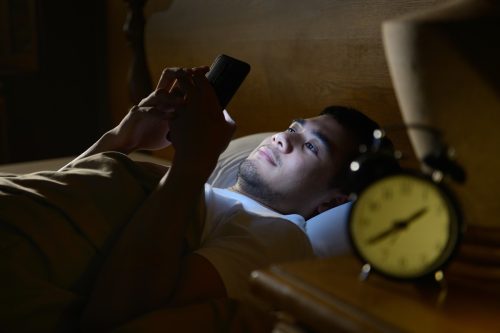
As you get ready for bed, you'll want to be mindful of limiting unnatural light.
"Phones, tablets, and TVs emit blue light, which can mess with your circadian rhythm and tell the body that it is daytime—time to stay awake," explains Candice Seti, PsyD, a licensed clinical psychologist who specializes in insomnia treatment.
To prevent this from messing with your sleep, Seti recommends setting a clear curfew for any screen time.
"It's best to avoid all these things starting at least two hours before bedtime," she recommends.
7
Do some stretches before bed.
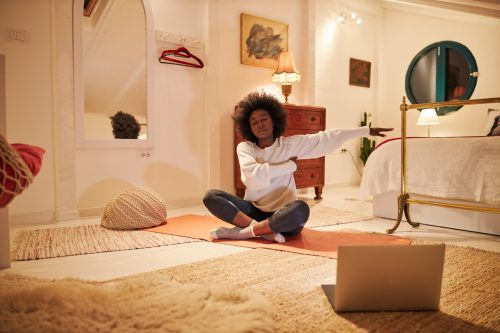
Mike Basten, DPT, CEO of Foothills Physical Therapy & Sports Medicine, is working to improve his patients' health by "adjusting their bedtime routine to include easy-to-perform stretches."
There are three stretches he recommends to help people "achieve restorative sleep." This includes the 3-Way Prayer Stretch, which you start by sitting on your heels in a kneeling position, leaning forward, and then extending your arms in front of you on the floor.
"Move your hands to the right to stretch the left side of your back, hold, and switch to the left to stretch the right side. Finish by stretching directly forward to elongate the spine," Basten says. "Do this three times in each direction, holding for 30 seconds each time."
The other stretches he suggests are lower trunk rotations and diaphragmatic breathing—both of which can promote relaxation and help you "ease into a restful sleep," he notes.
8
Take a few minutes to rest your legs up on the wall.
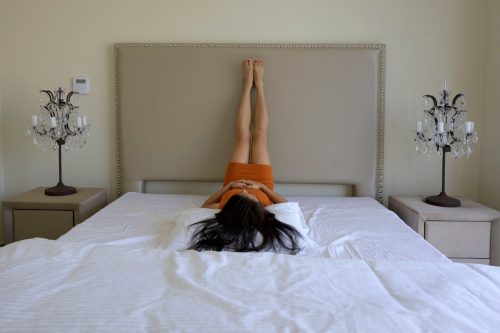
If you don't think you'll be able to commit to full-on stretches every night, Lauren Hays, psychiatric mental health nurse practitioner and co-founder of The Matrescence, has an even easier trick that might help you out. She suggests resting your legs up on the wall for eight to 12 minutes each night to "improve your sleep quality."
But how does this affect your sleep? Well, for one thing, "it pulls you out of 'fight or flight' mode (sympathetic nervous system) and kicks your nervous system into parasympathetic or 'rest and digest'," Hays explains.
It also "slows your heart rate and signals to body it's safe and time to rest," she adds.
RELATED: 4 Simple Sleep Habits That Help You Live Longer, New Research Shows.
9
Try mimicking "puppy energy" to wind down.
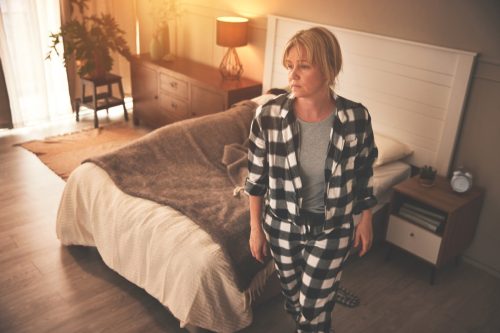
Like Hays, behavioral therapist Jennie Lannette Bedsworth, LCSW, has a more "unconventional method" she recommends as a bedtime routine. She refers to her approach as "puppy energy."
Essentially, the idea is that you should try mimicking the behavior of a dog winding down for the night.
"Think about how a pup will circle their bed a few times, maybe potty one last time, then settle in with some deep exhales and body shakes before drifting off peacefully," she says.
Translating this for humans, it might include you "doing some light movement like swaying gently side-to-side or shaking out the limbs, taking a final bathroom break, diffusing lavender or another calming scent, and then consciously releasing bodily tension through deep breaths," according to Bedsworth.
"The animal instincts to prepare a cozy, safe rest space and shake off excess energy can be shockingly therapeutic," she shares.
10
Tune into some calming music or white noise.

If you're still struggling to sleep through the night, maybe some soft melodies are just want you need. Consider turning on calming music or even white noise, which can include sounds of rain, ocean waves, or fans, Michael Kane, MD, board-certified physician and chief medical officer at the Indiana Center for Recovery, advises.
"This can drown out any external noises that may disrupt your sleep, and the repetitive sounds can be soothing and lull you into a more restful state," he says.
11
Pick your preferred last-minute calming activity.

One of the most important bedtime routine tricks involves "picking one calming activity for those final moments awake," Seti says.
This can be any tech-free activity that helps you relax in the last five to 10 minutes before you fall asleep—and by doing it every night, it can help you signal to your body that it's almost time to fall asleep, according to Seti.
"Whether it's meditation, light journaling, or gentle stretching while seated in bed, find a low-key activity to cap off the night and help your mind and body relax," she advises.
Best Life offers the most up-to-date information from top experts, new research, and health agencies, but our content is not meant to be a substitute for professional guidance. When it comes to the medication you're taking or any other health questions you have, always consult your healthcare provider directly.
This story has been updated to include additional entries, fact-checking, and copy-editing.
- Source: Sleep Medicine Reviews: Before-bedtime passive body heating by warm shower or bath to improve sleep: A systematic review and meta-analysis
- Source: Journal of Physiological Anthropology: Effects of thermal environment on sleep and circadian rhythm
- Source: Johns Hopkins Medicine: Preparing Your Bedroom for a Great Night's Sleep





















